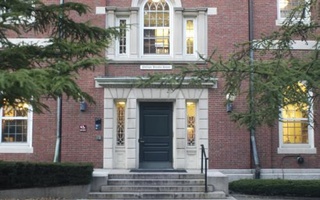{shortcode-9fa24a119b933f9f5f4639aaf7059e35dc7ee394}UPDATED: September 22, 2015, at 2:41 a.m.
University President Drew G. Faust stared out into a packed, silent audience Monday night. She was in Harvard’s Science Center for a town hall meeting, set in front of a crowd of hundreds of University affiliates concerned about the prevalence of sexual assault on campus.
Earlier in the day, the Association of American Universities released the results of a much anticipated sexual assault climate survey from last spring, and the results, in Faust’s own words, were “deeply disturbing.” Thirty-one percent of surveyed senior women at the College said they had experienced sexual contact without their consent during their time at Harvard, and 16 percent said they had experienced nonconsensual completed or attempted sexual penetration.
There was no applause or murmuring after Economics professor David I. Laibson ’88, a member of the University's sexual assault task force, presented Harvard’s specific results. Laibson took his seat in the front row and Faust rose. For 45 minutes, she fielded questions from a visibly emotional and perturbed crowd, all the while maintaining a certain candidness and concern.
“I find these numbers anguishing,” she began. “Anguishing for the individuals whose lives have been devastated, anguishing for all of us who want to believe that this is a community defined by our care and respect for one another.”
Aside from her occasional meetings with Undergraduate Council—which do not often draw the same crowd or intensity—Faust does not typically field questions at length from undergraduates. On Monday night, though, she approached the task eagerly, scanning through an alert audience, handpicking attendants to share questions and often criticisms.
One asked Faust how she would characterize the University’s response to sexual assault.
“I think these numbers show it’s completely insufficient,” Faust responded. “We have a huge amount of work to do and we need to change this culture and these kinds of realities.”
Another undergraduate asked about Harvard’s plans for addressing cases of sexual assault in dormitories. Looking up over her front-row cadre of top administrators including Provost Alan M. Garber ’76 and Dean of the College Rakesh Khurana, Faust emphasized the importance of communal collaboration in tackling the issue.
“This is not just my responsibility, though it’s certainly my responsibility. It’s the responsibility of every single person in this room, and we need to make sure that this is not the community which we live in for very long,” she said. “We need to make this different, and all of us need to be engaged in doing that.”
Other students focused on final clubs—a topic about which Faust recently spoke out—and social spaces on campus, as well as orientations for students about Harvard’s sexual assault procedures and resources.
Faust’s answers made it clear that her distress over the survey results comes from a deeply personal place, and she elaborated on that feeling after the forum.
In an interview, Faust referenced the 90 senior women at the College who reported experiencing completed or attempted penetration without their consent during their time at the College.
“I just think that’s horrifying,” she said. “It just tears me apart, so I do see the individuals and that's why it makes me so upset.”{shortcode-d17b733ba403bb1994231b1409789eebc596aa53}
In recent years, Harvard and other universities across the nation have come under scrutiny from the U.S. Department of Education, especially surrounding Title IX and administrative responses to sexual assault.
On a campus where change is often slow, Faust seems committed to rallying Harvard students, faculty, and affiliates around this issue. In April 2014, she convened a task force focused on sexual assault and misconduct in response to these concerns, and she has followed the advice it has offered, such as increasing funding for the student sexual assault support services. In July 2014, Harvard unveiled a new University-wide sexual assault policy and procedures, as well as a centralized investigatory office for complaints, the Office for Sexual and Gender-Based Dispute Resolution.
Some of those changes have faced criticism, but on Monday night, Faust promised further meetings and forums.
“It still makes me sad that this is something that troubles this university and these individuals and all of us so very deeply,” she said afterwards. “It shouldn’t. It’s not the institution, it’s not the community I want Harvard to be.”
—Staff writer Theodore R. Delwiche can be reached at theodore.delwiche@thecrimson.com. Follow him on Twitter @trdelwic.
—Staff writer Mariel A. Klein can be reached at mariel.klein@thecrimson.com. Follow her on Twitter@mariel_klein.
Read more in University News
A University-Wide Survey, With a College FocusRecommended Articles
-
On Farkas Stage, Alumni and Faust Talk 'Whiplash'At a panel introduced by University President Drew Faust, three College alumni discussed their work in creating "Whiplash," a film about a jazz student and his instructor.
-
 Despite Progress, No Plans To Raise Campaign Target
Despite Progress, No Plans To Raise Campaign Target -
 $15 Million Gift Will Fund Public Service Initiatives
$15 Million Gift Will Fund Public Service Initiatives -
The First Step on a Long RoadAs President Faust rightly says, final clubs in their current form are dangerous to the fabric of life at the College.
-
A National Epidemic Hits HomeSexual assault is an epidemic on college campuses across the nation, and ours is no exception.













